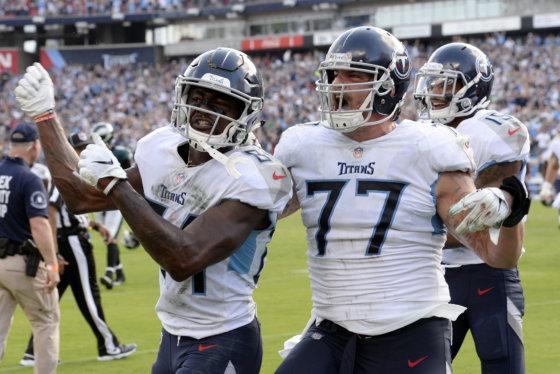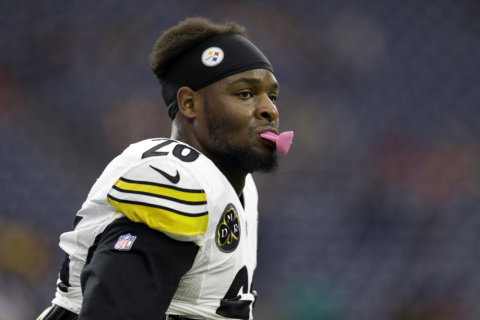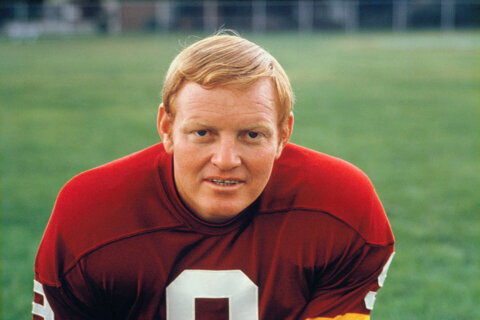WASHINGTON — As Earl Thomas was carted away from the field in Arizona, his broken leg wrapped in an air cast, it became crystal clear why he — and players like Le’Veon Bell — hold out.
The 29-year-old Seahawks safety, playing in the last year of his contract, stayed away from any and all of Seattle’s offseason practices until the team offered him the lucrative extension he deserves. But as a team leader and the last remaining member of the fabled “Legion of Boom,” Thomas opted to show up to play for his team in the regular season — a decision he now likely regrets after fracturing his left leg Sunday (as evidenced by his, um, colorful response).
In that moment, Bell’s holdout made all the sense in the world. The Bell situation is obviously not an apples-to-apples comparison — Thomas is under contract, Bell literally isn’t until he signs his franchise tender and finally reports in a few weeks — but the overall sentiment remains: Pinching pennies when it comes to elite, homegrown talent is bad for everyone.
Nobody absorbs more contact than running backs, and few of them carry the load Bell does. Last year, he had 406 touches — which means 406 opportunities to get hurt, not including plays in which he blocks. Statistically speaking, a safety like Thomas should have been more likely to get out of the 2018 season healthy enough to get paid, but in a violent sport like football, the only safe bet is that your turn to take a ride on the injury cart is coming eventually.
I can already hear the “they signed a contract, they should honor it” crowd. You too, “team before individual” folks. Those sentiments aren’t necessarily wrong, but they are shortsighted when referencing this particular sport.
Football players are people too. You and I ask for raises and still go to work every day if that request is denied — but we don’t carry a high risk of blowing out a knee or getting a concussion at work. And if we do, we get worker’s comp, not fired because we’re not deemed gladiator material anymore.
The players have to step up and aggressively advocate for themselves because their players union routinely fails to do so. In a variety of facets — the lack of guaranteed contracts, the brutal nature of the sport — the NFL’s non-QBs are the most vulnerable athletes of any in American professional sports, yet the least protected. Given the response to Thomas’ injury, that’s not lost on these players.
Well said bro!! @thEMANacho !!
— Will Blackmon (@WillBlackmon) October 1, 2018
The players’ desire for a bigger slice of the proverbial pie isn’t some greed-driven power play. The NFL is the obscenely rich entity that it is because people are willing to pay top dollar to see the best of the best play the game of football. Earl Thomas. Le’Veon Bell. Khalil Mack. Aaron Donald. Elite players who do something incredible whenever you see them play.
It’s galling those specific players all had to resort to a holdout to get paid what they’re worth. Nobody’s paying to see Steelers GM Kevin Colbert save $10 million in cap space. Or Cowboys owner Jerry Jones cackling because he found himself a franchise quarterback in the fourth round of the draft for pennies on the dollar. Players like Mack help bring in more money than they cost, so teams should do what the Chicago Bears did: Find a Mack and run as fast as you can with as much money as you can carry to keep him in your uniform.
I get that general managers and owners looking to get bargains on players is part of the gig, but paying elite players elite money shouldn’t be a problem if you’re managing your cap properly. It’s one thing if you’re taking a hard line on, say, Josh Norman or Jordan Reed — players with questionable production or availability issues.
But players like Thomas, Bell, Mack and Donald are game changers. Mack is the catalyst for Chicago’s rapid ascension to contender status, and Donald is the best player on the league’s best team with a solution to the roughing the passer controversy that only he and Mack can really get away with.
Thomas is on that level. He’s the best safety in football, and without him and his two interceptions against the Cowboys, the Seahawks probably don’t win in Week 3. Any case to withhold an extension from him is a faulty one.
Obviously, the Seahawks giving Thomas an agreeable contract before the season wouldn’t have prevented his injury — it is, after all, the second time in three years he’s broken that leg — but Thomas would have the financial security he deserves and the team wouldn’t be steeped in trade rumors and negative narratives. It’s not a coincidence that Donald’s Rams — the only team that kept their All-Pro player and paid him accordingly — are the only of the four teams in question that aren’t struggling mightily at the season’s quarter mark.
Thomas gave the Seahawks the finger because the Seahawks gave him the finger first. Owners need to realize that players are the NFL’s most important asset — and paying top dollar for the top players is an easy way to make them feel that way and go right back to bleeding for you on Sundays.








